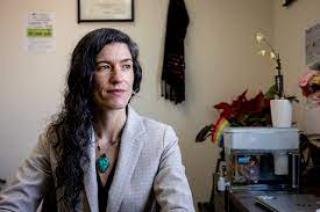When Natalia Vieira Santanna first moved from her home country Brazil to the U.S. in 2002 to live with her father, she didn’t think it would be permanent. She was 18 years old and planned on attending college to learn English, then returning home to pursue a career in international relations.
Fast forward to 2023: Santanna is running a successful immigration law firm located in the Fruitvale Transit Village.
Santanna Law Offices specializes in helping immigrants obtain citizenship or a visa through a family member who is a U.S. citizen, green card holder, refugee/asylee, or a U-visa holder. The firm also specializes in affirmative relief for immigrants, which refers to programs such as asylum, DACA, and Temporary Protected Status. And when a person is facing deportation, Santanna Law defends their right to stay in the U.S.
Santanna and her staff live in the East Oakland neighborhood, and Fruitvale’s immigrant community, largely comprised of Central Americans and Mexicans has proved to be a welcoming environment.
“I like to go to all the little shops and I go to the Mexican markets to buy food from my country; I need to buy yuca every week and they have it downstairs from my office,” said Santanna.
Like many immigrants, Santanna left her home country for economic and social opportunity
Growing up in the small town of Ibiúna in southern Brazil, Santanna had always been interested in activism and civic engagement. “I just wanted to really learn English for a few years, go back to Brazil, and then become a diplomat there,” she said.
Santanna’s dream would be indefinitely deferred for economic and personal reasons. “I was encountering a lot of difficulties. Economically, it was hard for me to study there,” she said.
At the turn of the 21st century, Brazil faced an economic crisis. Many working-class Brazilians were without jobs and could barely afford to pay rent. Santanna was feeling unsure about her future job prospects in her home country. She moved to Michigan, where she lived with extended family, and worked a slew of retail jobs. She attended community college to learn English and eventually graduated from Eastern Michigan University in 2007 with a bachelor’s degree in business administration and international relations.
At the same time, Santanna was learning more about herself. “I was figuring out I was queer, which is also hard in my country,” she said.
Some of Santanna’s Brazilian clients identify as queer and have migrated to the U.S. to avoid discrimination. Brazil has a complicated track record with LGBTQ rights; In 2006, the Guinness Book of World Records named The Pride Parade of São Paulo the biggest in the world. However, queer Brazilians were targeted as criminals throughout the dictatorship that held power from 1964 to 1985, and like in the United States, LGBTQ people still face considerable discrimination.
A few years after graduating, Santanna felt inspired to attend law school. “I was in the Detroit Area in Michigan and just being surrounded by immigrants, like my friends, and seeing how they were struggling. At that point, I already knew I wouldn’t be a diplomat but I saw it as a way of working directly with human rights.”
She enrolled in Michigan’s Wayne State University and graduated with a law degree in 2012. Passing the Michigan bar exam was a huge milestone moment. “I learned I passed the bar on Halloween night. I didn’t even want to open the envelope but I passed and it was a really good celebration,” she said.
Soon after, Santanna moved to the Bay Area to work for an immigration law firm in San Francisco. She started her own firm in Oakland in 2014. She initially opened her business in the Jack London area but thought Fruitvale would be a better fit for the work she wanted to do.
“I was really in love with the community here and as an immigrant, I liked how many immigrants are here,” Santanna said. “I started thinking about how I liked to have my business here and be a part of a community. I wanted to walk to my office every day, get my coffee here, and that was the beginning of the idea of moving here.”
Speaking the languages of their clients
Santanna Law mainly serves Fruitvale’s Central American, Mexican, and Yemeni communities, but the firm also attracts a lot of Brazilian clients that are scattered throughout the East Bay.
According to Santanna, it’s important that staff have a connection with the people they serve. “When I’m hiring, I try to go to the community first,” she said. “A lot of people don’t want to work in East Oakland. If they say something like, ‘Oh it’s different here,’ then I know it’s not a good fit.”
Santanna speaks Spanish, Brazilian Portuguese, and is currently trying to learn Arabic, and she encourages her staff to learn new tongues also. Most of her staff, including Shirly Nolasco, a legal assistant, speak Maya Mam. Nolasco believes that her proximity and cultural competency are important assets for serving the neighborhood’s fast-growing indigenous Guatemalan community. Most of these residents are native Mam speakers and sometimes have difficulty speaking English and Spanish.
“For my Mam speakers, they trust me because they know I’m translating well about what’s going on with their case,” Nolasco said.
Nolasco left her hometown of San Pedro Necta, Guatemala in 2015 when she was 14 years old to live in Florida with her older sister. Like many Guatemalans, Nolasco was escaping a depressed economy with few job prospects as well as state and gang violence.
“I’m indigenous and we face a lot of discrimination. I went through abuse from men too,” Nolasco said. “It was a big decision because I left everything there—my mom, my sisters, my friends— but thank God I made it here.”
She moved to Oakland in 2019 where one of her sisters lives and graduated from Fremont High School. Living in a new country while learning the language hasn’t been easy, but being around other indigenous Guatemalans in Fruitvale is a silver lining.
“It was hard to live in Florida because there were not a lot of Guatemalans and so it was hard to make my case in the courts; not many people spoke the [Mam] language,” Nolasco said. “Here it’s amazing because I feel like I’m home. You see people wearing indigenous clothing. When I was living in Florida I didn’t wear my indigenous clothes but here there are people here walking free; they can show who they are.”
Nolasco said the last three years she’s spent working at Santanna Law have given her a better understanding of this country’s immigration system. With this knowledge, she hopes to start attending college soon and is currently set on becoming a lawyer like Santanna.
“Before I started, my dream was to do social work but now I see that my people need more legal help. I know it’s a long path but one day I want to be an attorney,“ Nolasco said.
Santanna is proud of the business she has created as well as the opportunities she’s been able to provide to fellow immigrants like Nolasco. Still, working in this field is emotionally tiring.
“In the beginning, it was hard to separate myself from the work because I was exposed to so much pain and sadness,” Santanna said. “I have had to learn to protect myself so I can be a better advocate for my clients. I exercise, garden, and try to learn other things too because it’s too easy to get absorbed into the work.”










